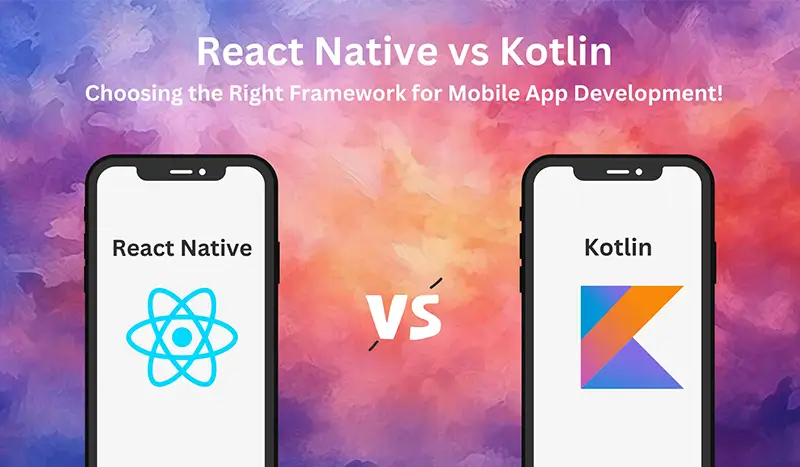In today’s digital age, mobile app development has become a crucial aspect of any business’s growth strategy. With a wide range of frameworks and technologies available, developers are faced with the challenge of selecting the most suitable tools for building high-quality mobile applications. Among the popular choices, React Native and Kotlin stand out as two powerful options. In this blog post, we will explore the key differences and similarities between React Native vs Kotlin, helping you make an informed decision based on your project requirements.
React Native: Empowering Cross-Platform Development
React Native is a JavaScript framework created by Facebook that allows developers to build mobile applications for iOS and Android using a single codebase. With React Native, you can leverage your existing knowledge of React, a popular JavaScript library for building user interfaces, to develop native-like mobile apps. React Native utilizes a combination of JavaScript and native components, resulting in highly performant and visually appealing applications.
One of the main advantages of React Native is its ability to achieve code reuse across multiple platforms. By writing code once, you can deploy it on both iOS and Android, saving significant development time and effort. This cross-platform capability is particularly beneficial for businesses looking to reach a wide audience without investing in separate development teams for each platform.
Additionally, React Native provides a rich ecosystem of ready-to-use components and libraries, allowing developers to create stunning user interfaces. The framework also offers hot reloading, enabling real-time updates during development and facilitating faster iteration cycles.
Kotlin: Unleashing Native Development Potential
Kotlin, on the other hand, is a statically typed programming language developed by JetBrains. Kotlin is fully interoperable with Java, making it an excellent choice for Android app development. It offers modern language features, enhanced developer productivity, and seamless integration with existing Java codebases. Since its official adoption by Google as the preferred language for Android development, Kotlin has gained widespread popularity among Android developers.
One of the standout features of Kotlin is its enhanced null safety. By making null references a part of the type system, Kotlin reduces the chances of encountering null pointer exceptions, a common pain point in Android development. This feature helps improve the overall stability and reliability of Android apps.
Kotlin also promotes concise and expressive code, reducing boilerplate and enhancing readability. Its seamless integration with Java allows developers to migrate existing Java projects to Kotlin gradually. This gradual approach enables teams to leverage Kotlin’s benefits without the need for a complete codebase rewrite.
React Native vs Kotlin: Choosing the Right Path
When it comes to deciding between React Native and Kotlin, several factors need to be considered. Let’s explore these factors in detail to help you make an informed choice:
1. Platform-specific Requirements
If your project requires deep integration with platform-specific features, such as camera access or advanced APIs, Kotlin might be the better option. As a native language for Android development, Kotlin provides direct access to Android APIs, allowing for seamless integration with device functionalities.
2. Performance and User Experience
While React Native provides impressive performance for most mobile apps, Kotlin offers a more direct path to native performance. If your project demands extensive computations or real-time rendering, Kotlin’s direct access to native resources may offer a performance edge.
3. Development Team Expertise
Assessing your team’s skills and familiarity with different technologies is crucial. If your team has a strong background in JavaScript and web development, React Native might be the more accessible choice. Conversely, if your team primarily consists of Android developers with Java experience, Kotlin would be a natural fit.
4. Code Sharing and Time-to-Market
React Native’s cross-platform capabilities allow for significant code reuse, minimizing development time and effort. If rapid development and faster time-to-market are essential considerations for your project, React Native’s ability to build for both iOS and Android simultaneously could be a compelling advantage.
5. Ecosystem and Community Support
Both React Native and Kotlin have robust ecosystems with extensive libraries and resources. React Native benefits from a large community of developers and a wide range of pre-built components, while Kotlin offers the advantages of being an officially supported language for Android development, backed by JetBrains and Google.
React Native, Kotlin, or Both?
In some cases, choosing between React Native vs Kotlin might not be necessary. The two frameworks can also complement each other in a hybrid approach, leveraging their respective strengths. For instance, you can build the core functionality of your app using Kotlin and utilize React Native for specific features or screens where cross-platform compatibility is paramount.
Another framework that frequently enters the conversation is Flutter, Google’s UI toolkit for building natively compiled applications for mobile, web, and desktop. Flutter combines the advantages of native performance with a fast development cycle. If you’re considering a comparison of React Native vs Kotlin vs Flutter, it’s essential to evaluate your project’s specific requirements and the skill set of your development team.
Conclusion
In the end, the choice between React Native vs Kotlin depends on your project’s specific needs, development team expertise, and platform requirements. React Native’s cross-platform capabilities and JavaScript familiarity make it an excellent choice for rapid development and code reuse. Kotlin’s native performance and seamless integration with Android APIs make it ideal for projects that demand deep platform integration and performance optimization.
Remember, there’s no one-size-fits-all solution. Each framework has its strengths and weaknesses. Assess your project requirements, consider the factors discussed in this blog, and consult with your development team to make an informed decision. By selecting the right framework, you can ensure a successful and efficient mobile app development process.
OdiTek’s experienced developers are skilled in developing mobile applications on various platforms, including Kotlin, React Native, flutter and more.
Contact us today to kick-start your mobile app development project.







